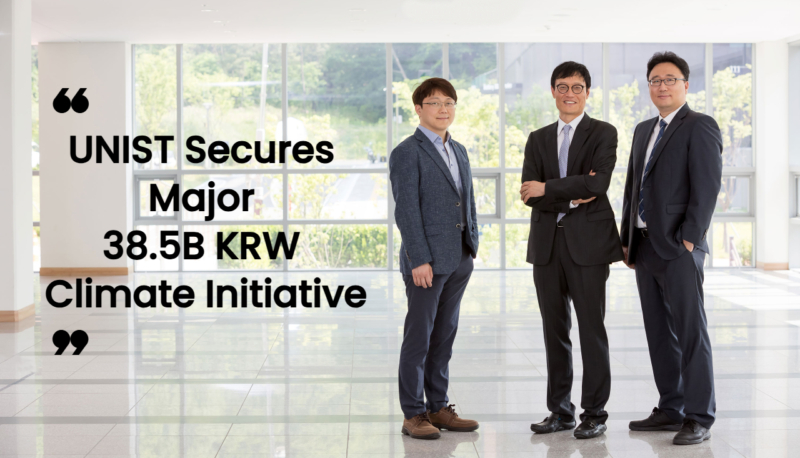UNIST has announced that it has secured a large-scale research project worth 38.5 billion KRW by the Korea Meteorological Administration (KMA), marking a significant step forward in climate change research and technological innovation. The Department of Civil, Urban, Earth, and Environmental Engineering will spearhead this ambitious initiative, which aims to develop advanced climate prediction systems, AI-based climate information services, and satellite data integration over the next seven years (2025–2031).
The project’s principal investigators are Professors Myong-In Lee, Dong-Hyun Cha, and Jungho Im, each leading distinct yet interconnected components of the comprehensive effort to combat the climate crisis.

Professors Myong-In Lee (Dept. of Civil, Urban, Earth, and Environmental Engineering)
Development of National Climate Prediction System
Professor Myong-In Lee will oversee a 14.1 billion KRW project dedicated to creating a ‘National Climate Prediction System for Climate Crisis Response.’ This system aims to generate accurate climate forecasts ranging from one month to ten years, tailored specifically to the rapidly changing climate conditions of the Korean Peninsula and East Asia.
Professor Lee emphasized, “As climate change accelerates, precise predictions tailored to the Korean Peninsula and East Asia are essential for effective response and adaptation.”

Professor Dong-Hyun Cha (Dept. of Civil, Urban, Earth, and Environmental Engineering)
Development of AI-Enhanced Climate Information Service System for Sectoral Applications
Professor Dong-Hyun Cha will lead a 12.1 billion KRW project focused on developing a demand-driven climate information service framework. By utilizing AI-based refinement techniques, the project seeks to improve the accuracy and resolution of climate data generated by the national climate system, delivering customized information suited to various sectors such as disaster management, health, tourism, and energy.
Professor Cha stated, “Providing more accurate and detailed climate information tailored to specific needs will significantly enhance our capacity to respond to the climate crisis across multiple sectors.”

Professor Jungho Im (Dept. of Civil, Urban, Earth, and Environmental Engineering)
Satellite Data Integration and Advanced Weather Prediction Technologies
Professor Jungho Im will manage a 12.3 billion KRW project to develop next-generation weather forecasting technologies using high-resolution data from the Chollian-5 satellite. The project aims to enhance AI-driven detection and prediction of hazardous weather, thereby strengthening capabilities to forecast extreme weather events.
Professor Im remarked, “As climate change leads to more frequent and severe weather hazards, the importance of satellite-based weather prediction has never been greater.” He further added, “We aim to harness cutting-edge AI techniques to deliver highly reliable, precise weather forecasts and services.”









![[2026 Matriculation] UNIST Welcomes Class of 2030!](https://news.unist.ac.kr/wp-content/uploads/2026/02/사진-박종래-UNIST-총장이-2026년-입학식사를-전하고-있다-2-190x122.jpg)
![[2026 UNIST Commencement] UNIST Confers Degrees to 883 Graduates](https://news.unist.ac.kr/wp-content/uploads/2026/02/사진-2026학년도-UNIST-졸업생들이-학사모를-위로-던지며-졸업을-축하하고-있다-1-800x413-190x122.jpg)




